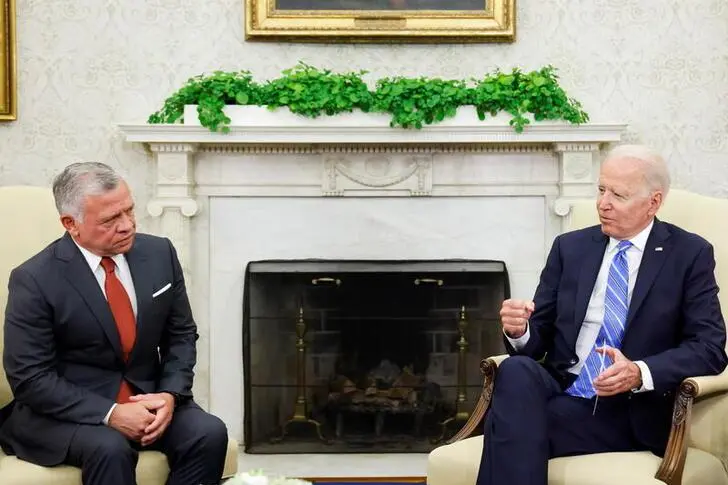PHOTO
During his visit to Washington last week, King Abdullah of Jordan raised the alarm about the formidable challenges facing his country and the region. His timely visit should alert the Biden administration about the growing threats to the Middle East’s security and stability.
The Jordanian monarch’s visit should remind the Biden administration, which has put much of its foreign policy focus on China, that it should not ignore the Middle East, which has a historical proclivity for erupting when it is least expected. There are the stepped-up attacks by Iranian-backed militias against US and coalition troops in Iraq and Syria. In addition, Iran’s meddling could upend the fragile security situation in Iraq and derail its parliamentary elections, which are scheduled for early October, with grave implications for the country and the region. Its meddling in Yemen has also made a political solution impossible, as its Houthi allies have stonewalled all calls to sit at the negotiating table. And in Lebanon, via Hezbollah, Iran is paralyzing the country’s politics and pushing it toward an economic and humanitarian abyss.
Jordan has always advocated dialogue, King Abdullah reminded his Washington audiences, noting the ongoing nuclear talks in Vienna and other discussions between Iran and its adversaries. However, he noted that the nuclear talks, which are postponed for the time being, have revealed a wide gap between Iran’s positions and those of the US and its partners. Jordan has concerns that it would like to be addressed in the talks with Iran and effectively dealt with.
Over the past year or two, Jordan has witnessed escalating dangers that the king hoped Washington would take into consideration. While the Vienna talks were focused on nuclear proliferation, there were other equally alarming and dangerously escalating threats. He referred to the expanding ballistic missile warfare, which is growing in intensity and sophistication, citing attacks against Saudi Arabia as well as those directed at US and global coalition forces in Iraq and even Jordan itself, jesting that “what misses Israel lands in Jordan.” There are also growing direct drone attacks against Jordan that bear Iran’s signature, King Abdullah revealed.
The king referred to “increased cyberattacks” against Jordan. As an important partner in the fight against terrorism and Iran-backed armed groups, Jordan has been a favorite target in the field of cyberwarfare. In May, the FBI and the Australian Cyber Security Centre warned of a ransomware campaign targeting multiple sectors in various countries, including Jordan. The targeted industries included academia, airlines, construction, energy, equipment, financial, freight, government, health, IT, law enforcement, manufacturing, marketing, retail, and the pharmaceutical sector.
The Washington-based Center for Strategic and International Studies also reported that, in January, hackers linked to Hezbollah breached telecommunication companies, internet service providers, and hosting providers in several countries, including the US, UK, Egypt, Israel, Lebanon, Jordan, Saudi Arabia, the UAE, and the Palestinian Authority, for intelligence gathering and data theft.
King Abdullah also revealed increased firefights on Jordan’s borders to a point not seen since the peak of the fight against Daesh.
The Jordanian monarch has raised the alarm about Iran’s regional hegemony before. In 2004, he warned about Tehran’s efforts to form a “Shiite crescent.” Asked during his Washington visit last week about this prescient warning 16 years ago, he clarified that he had meant Iran’s moves to subvert Arab governments. By weaponizing sectarian identity, Iran succeeded in destabilizing the region, spreading chaos and exercising effective control beyond what most people thought possible.
While in Washington, King Abdullah reiterated Jordan’s firm belief in the two-state solution and denounced irresponsible statements by right-wing Israeli leaders that Jordan could be an alternative homeland for Palestinians. Reaching a fair solution to the Israel-Palestine conflict has an existential significance for Jordan, which strongly opposed former US President Donald Trump’s 2017 declaration on Jerusalem, as well as his tacit support for Israel’s unilateral moves in the Occupied Territories. Jordan has consistently called for a resumption of peace talks. Israel’s harsh treatment of the Palestinians and its unilateral moves to extend its control of the occupied territories directly threatened Jordan’s security and stability.
King Abdullah did not dismiss the protests that Jordan has witnessed, saying candidly that protesters had “legitimate concerns,” but he denounced attempts to use them to destabilize his country.
Biden reassured the king that the US “will always be there for Jordan.” King Abdullah replied: “You can always count on me, my country, and many of our colleagues in the region.” According to US Agency for International Development figures, America has provided Jordan with substantial aid over the years, reaching $1.9 billion in 2020 from all government agencies. In addition, the US last month deployed new defense equipment to Jordan. This month, it provided 500,000 coronavirus disease vaccines to help Jordan deal with the pandemic.
With the growing threats Jordan faces — along with the burdens of fighting the pandemic and caring for a large refugee population — it should expect additional support from Washington and the wider international community to bolster its defenses against emerging external threats, renew efforts toward an acceptable solution to the Israel-Palestine conflict, and support its economy through increased levels of trade and investment to provide jobs, reigniting economic activity and meeting young people’s expectations.
- Dr. Abdel Aziz Aluwaisheg is the GCC Assistant Secretary-General for Political Affairs & Negotiation. The views in this piece are personal and not necessarily those of the GCC. Twitter: @abuhamad1
Copyright: Arab News © 2021 All rights reserved. Provided by SyndiGate Media Inc. (Syndigate.info).





















